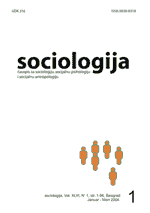Finansijska globalizacija i ekonomski suverenitet
Financial Globalisation and Economic Sovereignty
Author(s): Fikret ČauševićSubject(s): Economy
Published by: Sociološko naučno društvo Srbije
Keywords: financial liberalisation; international capital flows; developed countries; developing countries; economic policy; economic growth; economic sovereignty;
Summary/Abstract: A number of very significant changes took place in the international financial system at the beginning of the 1970s, as a result of changes in the relations of economic power between the most developed countries in the world. A number of new financial instruments appeared in response to the new conditions on the international currency and financial markets, with far-reaching implications for the efficiency of national economic policy, in particular on the three main segments – monetary, fiscal, and exchange rate policy. The process of financial liberalization began in the late sixties and early seventies and became a dominant characteristic of the final two decades of last century. The essence of financial liberalization is the elimination of the state’s influence on the extension of credit, interest rates, bank-ownership, and the free movement of international capital. In the process of financial liberalization, countries with developed market structures and powerful financial institutions were at a great advantage over countries whose financial sector was poorly or under-developed. As a result of their very different starting positions, the process of financial liberalization during the last two decades led to a doubling of the gap between the richest and the poorest countries. Two decades ago, the richest five countries in the world were 128 times richer than the five poorest countries. During those two decades, this became 249 times richer. A change in business philosophy and the mission and goals of companies could well have a progressive, development impact, with a view to reducing the wealth gap, particularly in regions and countries sidelined as regards development until now. Nevertheless, international economic and financial groups and institutional capacity-building in national governments, including the ability to carry out an efficient macroeconomic policy, will continue to have a vital role to play in stimulating development and reducing these enormous disparities.
Journal: Sociologija
- Issue Year: 46/2004
- Issue No: 1
- Page Range: 71-95
- Page Count: 25
- Language: Serbian

